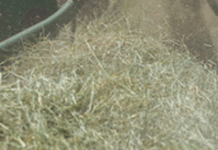If your heifers are bangs tagged, those orange metal clips will soon be a relic of the past. Starting November 5, 2024, your veterinarian will not be tagging with metal clips, but instead will use electronic identification (EID) tags.
Veterinarians used metal clips to identify heifers receiving the brucellosis vaccine (“bangs”), and to identify animals moving between states.
In the spring of 2024, the Animal and Plant Health Inspection Service (APHIS) announced mandatory EID tags for certain bovine classes. This builds upon the 2013 ruling that only requested visual ID tags. The electronic version will be used to track and contain animal disease outbreaks, just as the metal identification clips did.
What is a USDA 840 EID Tag?
The EID tags replacing the metal clips are USDA 840, showing the country code for the United States (840), with the official USDA shield. The remaining 12 numbers are unique to the tag/animal. The 840 tags provide animal identification to trace animal movements in the event of an animal disease. The 15 numbers can be visually read off of the EID button, or can be read with a computerized EID reader or wand.
There are other types of EID tags, but only 840 EID tags will fulfill the APHIS ruling to replace the metal clips.
What does the EID mandate mean for cattle producers?
- Animals with the old metal tags already in their ears are “grandfathered in” and will not need new 840 EID tags.
- “840 EID” tags can come as “buttons” with no hanging tag, as long as the 15- digit number is viewable on the top of the button.
- The buttons can come with matching visual hanging tags.
- Some “840 EID” tags should be placed in the middle rib of the ear, unlike the metal clips that were placed in the top portion of the ear.
- This could be an issue if you have a visual tag in each ear, plus a fly tag in each ear. Adding an EID tag would make 5 tags per animal, and you may run out of room in their middle ribs.
- Reach out to the tag manufacturer for tag placement recommendations.
- Producers will need to establish a premise ID number or use the premise ID number of their veterinarian.
- You or your veterinarian may put in 840 EID tags. Your vet will put 840 EID tags only into animals that used to require a metal clip for identification.
- For example, if a producer tags all their calves at weaning with 840 EID tags, your vet will record those EID numbers when they give the bangs vaccine to your heifers. The vet would not have to put a new EID tag in.
- Check with the sale barn on what records are required.
- For example, if you are selling breeding heifers, records showing the EID numbers matching the “bangs” vaccination might be helpful.
What will change for your veterinarian?
- After November 5, 2024, your vet will be tagging with 840 EID tags instead of the metal tags.
- The United State Department of Agriculture (USDA) is providing a certain number of tags for each state, during the transition. Veterinarians can receive tags for replacement animals.
- If a disease is traced back to that veterinarian’s premise ID number, then the vet will work with the Department of Agriculture to track the path that animal. Ideally, the EID tags will speed up the process and reduce losses during a disease outbreak.
More information can be found at the Animal Disease Traceability (ADT) website at: https://nda.nebraska.gov/adt/index.html . The NDA will host an informational webinar on October 22, 2024 at 6 pm CT- to join the webinar, click here.




